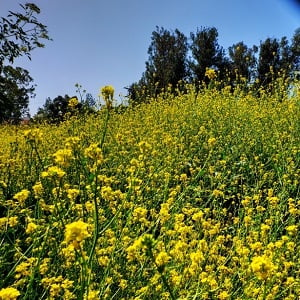 Today’s first reading is an elephant that I’m not going to touch with a thirty-nine-and-a-half-foot pole. It’s hard enough to breath in this calm before next Tuesday’s storm without letting an elephant sit on my chest, thank you very much—and while you may despise my mixed metaphors and unseasonal Grinch references, I expect you feel the same. Let’s leave Ephesians 5:21 and all that “mutual submission” stuff to Pope John Paul II, Pope Francis and squirming pre-Cana-nites everywhere. Instead, let’s talk mustard.
Today’s first reading is an elephant that I’m not going to touch with a thirty-nine-and-a-half-foot pole. It’s hard enough to breath in this calm before next Tuesday’s storm without letting an elephant sit on my chest, thank you very much—and while you may despise my mixed metaphors and unseasonal Grinch references, I expect you feel the same. Let’s leave Ephesians 5:21 and all that “mutual submission” stuff to Pope John Paul II, Pope Francis and squirming pre-Cana-nites everywhere. Instead, let’s talk mustard.
The mustard “tree” is in fact an herbaceous annual that tops out around 9-10 feet tall with no known bird dwellers to speak of. Forget the illustrations of lush shrubbery filled with jewel-toned peacocks you grew up with and instead think of the yellow-flowered weeds that grow along the highway. Who knew that heaven reigned between mile marker 496 and 360 of the I-90?
As regency symbols go, Brassica nigra lacks a special something. Unlike Abraham’s oaks (Gen. 8:11) or Solomon’s cedars (1 Kings 5:10), Jesus’s mustard plants cannot shelter the lowly from the storm nor can they withstand the first frost. Unlike the sticky-sweet fig trees of the promised land (Deut. 8:8), mustard seed scalds the tongue and disguises the taste of meals past their prime. Unlike the thorn bush (Judges 9:8), the mustard plant has no prickles with which to protect or intimidate. It’s basically (brassically?) cabbage. In short, Jesus says “mustard tree,” everyone nods for a second, thinking they misheard, and then goes “what?”
It’s tempting to make this parable about finding a little Heaven in everything you see. To quote Eeyore, “weeds are flowers too, once you get to know them.” It’s a nice thought, but a little too neat to bring answers, or even comfort, when the world is so stubbornly messy. As COVID-19 reminds us every day, the carefully tended gardens we make of our lives can be instantly overrun. Overnight, blight takes the tomatoes and we awake to beetles in every rose. We could stand in the ruins, gaze at the mighty oak, and futilely wish to plant something so strong and see it flourish. But that’s not the vision of heaven Jesus shares with us. God’s kingdom isn’t a tree towering over us, unconcerned with our ephemeral pains and pleasures. Nor is it a delicate flower, demanding constant attention or else leaving us forever. No, heaven’s a weed: aggressively storming our defenses, taking over our gardens and waving 10-foot eyesores in our face. Heaven isn’t hidden in the woods, secreted away for only the most discerning or courageous. Heaven comes to us, even when we don’t want it, and gives us every opportunity to let it grow inside our lives. But perhaps heaven, like mustard, is an acquired taste we only learn to love when adversity (i.e. unidentified meat product) demands—a shelter for only the most desperate birds and a king only among weeds.
With that last mutilated metaphor, I hear your groans of appreciation and pray that you may find a few weeds in your garden today.



